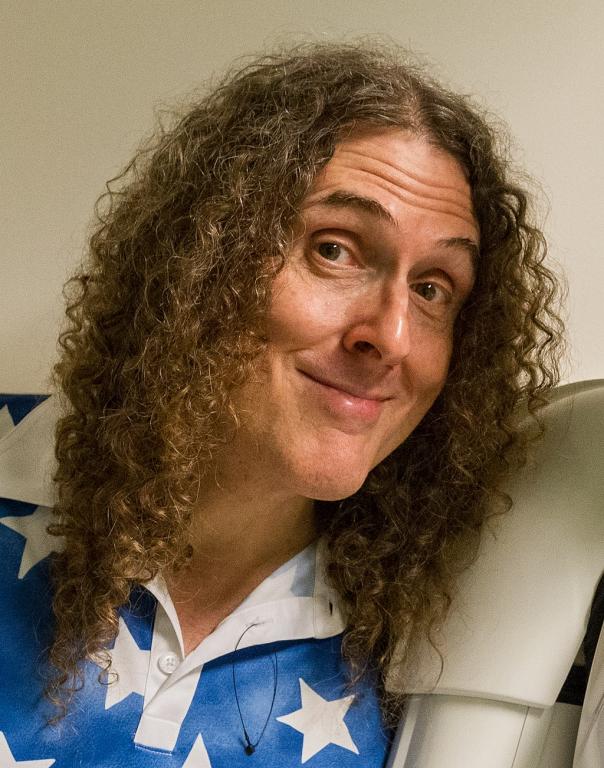(my bolds):
What a Weird Al parody did was enact a tiny revolution. It took the whole glamorous architecture of American mainstream cool — Michael Jackson’s otherworldly moves, Madonna’s sexual taboos — and extracted all of the coolness. Into that void, Weird Al inserted the least cool person in the world: himself. And by proxy, all the rest of us weirdos, along with our uncool lives. “Beat It,” a ubiquitous superhit about avoiding street violence, became “Eat It,” a nasally monologue about picky eating. (“Have a banana, have a whole bunch — it doesn’t matter what you had for lunch. Just eat it.”) “I Love Rock ’n Roll,” a churning anthem of hard living and the devil’s music, became “I Love Rocky Road,” a squawking paean to stuffing your face with ice cream. It is no accident that much of Yankovic’s music was about food — everyone ate food, every day, celebrities and nerds alike. It was the great equalizer. . . .
Michael Schur, the creator of “The Good Place” and co-creator of “Parks and Recreation,” remembers the force of Weird Al’s 1992 parody of Nirvana.
“ ‘Smells Like Teen Spirit’ comes out, and it’s like the perfect voice for all the simmering anger of an entire generation of kids,” Schur said. “That song is vicious and angry and aggressive but also laconic and disaffected and scary. And it was immediately a gigantic thing in American culture. Then Weird Al does ‘Smells Like Nirvana’ and completely deflates it — the importance and seriousness and angst. That’s a service he has always provided: to remind people that rock is about grittiness and authenticity and finding your voice and relating to an audience, but it’s also fundamentally absurd. Being a rock star is stupid. We as a culture are genuflecting at the altar of these rock stars, and Weird Al comes out with this crazy curly hair and an accordion, and he just blows it all into smithereens by singing about Spam.
Absurd as it sounds, Alfred Yankovic may constitute the final link in the holy trinity of 80s American pop culture alongside Dolly Parton and Fred Rogers. What I mean is he appears to be that rare celebrity who understands–and fulfills–his role as a spiritual calling. A vocation, if you will. Because what Anderson describes in the article is nothing short of a ministry. This is a man whose art and presence, under the auspices of pure ridiculousness, imparts grace to those who come into contact with it. And not a superficial form either.
There’s a clear link here between the unlikelihood of the messenger and the depth of the resonance, something dead serious (and good!) transpiring under the aegis of the absurd. . . .
The first inkling I got came after A Mess of Help came out. I had spoken at an event somewhere, and afterward, a middle-aged woman approached me to asked me what I thought about… Weird Al. The gleam in her eye told me it was less of a question and more of a secret handshake. If it was a test, I failed. But I heard from her a few months after the event, saying that she’d put a copy of the book in his hands at a meet-n-greet, and then asking me to pray for him, since he was on the road and far from his… church. Huh, I thought, filing that last tidbit away for a rainy day reddit investigation.
Well, Anderson’s article has officially spared me that investigation. His testimony of what Weird Al meant to him growing up–as well as what Al meant to Andy Samberg, Lin Manuel-Miranda, and Michael Schur (Parks and Rec, The Good Place)–stopped me in my tracks. And Al’s own “origin” only made matters more profound. This wasn’t that cruel subversion known as nerd-cool, nor a novel strand of seculosity. It was something far more beautiful, more akin to a ministry of grace than anything else. That the grace in question might be based in something deeper than human kindness, well, it’s enough to make this grown man feel like a kid at Spatula City.
Indeed, Weird Al’s Wikipedia article, which is also worth reading, confirms that he “identifies as a Christian.”
Longtime reader and commenter on this blog Steve Bauer, who alerted me to these articles, which for some reason made him think of me, and observed, “Maybe words like ministry and grace are a bit of a stretch, as they usually are terms that carry an explicit Christological referent for Lutherans, so perhaps we would have to find a more generalized word for ‘unfettered favor that reflects the love of God (for the weird).'” Good point.
But still, we can see how being a comedian can be a Christian vocation, a way of loving and serving one’s neighbors. Not just by helping the neighbors laugh, thus lightening their burdens, but also, in this case, by subverting the fashionable culture that the neighbor might otherwise take too seriously.
I close with this example:
Photo by Chris Favero from USA / CC BY-SA (https://creativecommons.org/licenses/by-sa/2.0) via Wikimedia Commons













